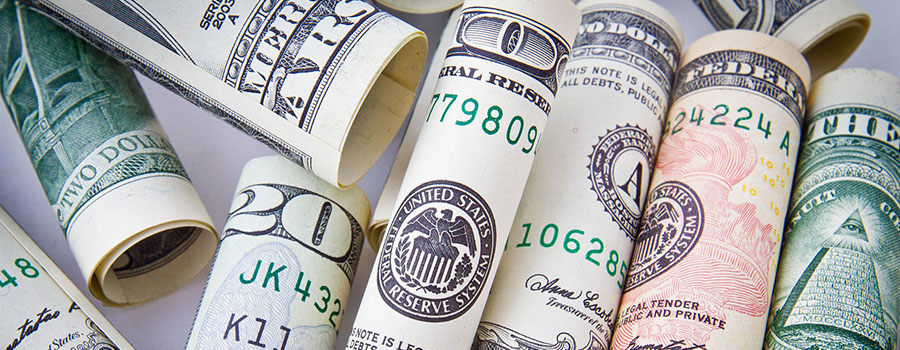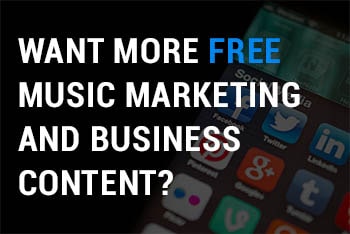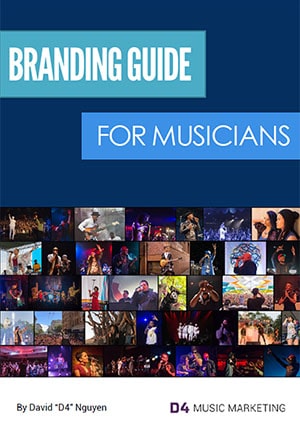
Understanding music royalties can be confusing, but very necessary for musicians who are new to the music business. I know I’m not the only one who struggled with this topic, so my goal was to put this together to help break it all down. I wanted to make it simple so that anyone who has no idea about the music business can easily understand… hopefully.
I’m by no means an expert, but this is more of an overview behind royalties through music publishing and master recordings as well as how to collect them.
What is music publishing? Simply put, it’s making money from songs you wrote and own the copyrights for. This happens through some form of licensing or giving permission to some entity to use your song in exchange for some monetary compensation.
Earning money from your copyrighted music is a form of passive income. Early on, it may not be much, but the goal is to build a catalog of songs over time and grow its value as you build your fanbase. Every song matters. It can potentially help get you discovered and generate income from all around the world.
As a musician, you need to take advantage of every income stream that you can access or earn. With the decline of record sales over the past decade and the increase in music streaming, the one thing you have to know about is all the different royalty streams you can earn from your music.
It can be a complicated topic with laws and procedures in different countries, but I will be focusing on the basics as it is applied in the United States.
Why understanding music royalties are so important
Kobalt, a music publisher, found 900,000 distinct income sources for one hit song. That’s a lot of potential money available for performing artists and songwriters!
Not only that, but there’s also actually a lot of royalties just sitting out there unclaimed. Because of technology in an evolving industry like music, Berklee College of Music found in a 2015 report that anywhere from 20% – 50% of music payments do not make it to their rightful owners.
It’s been referred to as the black box of royalties. This is unpaid money (reportedly in the billions) that has not been properly distributed to artists due to faulty metadata or poor communication between services and organizations responsible for tracking and reporting these types of things.
Income streams are so important for independent artists. The fact is one song has the potential to make you money in many ways. It’s important to read up on all different music royalties so you’re not leaving potential money that belongs to you, sitting somewhere.
Before going any further, there are a few important terms and distinctions that need to be discussed:
- Royalty
- Copyright
- Songwriter
- Recording Artist
- Producer
- Composition
- Master Recording
- Music Publisher
- Record Label
What is a Royalty?
A royalty is a payment to the copyright owner for licensing the use of their asset or property.
As a songwriter, a royalty is money that is owed to you by some party for using your copyrighted music. For example, if someone streams your song on Spotify or Youtube, there’s a royalty for that and you would get paid by the platform. If you do a cover of someone’s song, they get a royalty from you.
If you own the copyrights to your songs, you’ll definitely want to collect all the possible royalties from your music. There are a number of different ways you can get paid for your songs, which will be discussed later.
Important Distinctions
Songwriter vs Recording Artist
A songwriter creates a musical composition, which is essentially the blueprint of a song. The authors of a composition are typically the lyricists (who write the words of a song) and the composer (who writes the music body or melody itself).
A recording artist is someone who performs the music composition that a songwriter creates. Generally speaking, the authors of a sound recording are the recording artist (who performs the lyrics) and the producer (who is in charge of how the composition sounds sonically).
These are important distinctions as the royalties involved are different for what role each person plays in the creation of a song. In some cases, the songwriter and recording artist are the same person or group in which they get more of copyright ownership and a larger share of royalties.
Composition vs Master Recording
There are two general parts of music that can be monetized, the composition (lyrics, melody, music) and the recorded version of the composition (also known as the sound recording, master or master recording).
A recording artist is involved in a master recording by performing the musical composition that a songwriter created. For instance, if Beyonce sings a song that someone else wrote and produced, she would be the recording artist.
Music Publisher vs Record Label
The musical composition of a song includes things like the structure, lyrics, melody and chord progression. In this case, a music publisher handles this aspect of music, whether it’s to help with the writing of the music to be performed or find opportunities for collecting royalties. Publishers represent songwriters and the compositions they create.
The master recording is the final product that you would typically consume or listen to when it comes to music. In the music industry, a record label is usually the one who will help you create the master recording so it can be sold and consumed to the public, whether it’s a physical copy or made available to download. Therefore, a label represents recording artists and the sound recording.
I like to think of the composition as a blueprint of the song where other artists can recreate or record their own master recording of it. This is essentially what we know as creating a ‘cover’ of a song.
It’s important to understand these concepts first as it starts to get confusing later when it comes to discussing licensing and royalties.
What is a Copyright?
The most fundamental part of music royalties is the copyright. Without any ownership of the composition or sound recording, you do not get any money or royalties from the song or record.
For more details about copyrights, you can read this blog on the basics of music copyrights that all musicians need to know.
What is a license for?
If any individual, group or company wanted to use your music for any reason, whether it’s the master recording for a video or the composition for a cover, they will need a license so that you, as the copyright owner, can get money from it in the form of a royalty. There are fair use laws, but I won’t go into that.
The licensing money you get when someone uses your music composition is set by the government at a flat rate (discussed below). Your permission is actually not required to obtain a license to use your music composition.
However, if someone using your composition wanted to tweak or change it a bit, like in a song cover, they would need your permission first. This includes changes like lyrics, melody and structure, but the tempo and key don’t need your approval.
On the other hand, if you have full rights to the master recording, you can charge someone as much as you want for a license to use your recording. Permission is required and you have the right to refuse requests.
What are the different royalties I can earn?
Depending on what ownership of a copyrighted song you have, you are entitled to collect certain royalties. Owning the copyright for a composition has music publishing royalties. Owning the master recording for a song has its own royalties.
It’s important to note that these different royalty streams are tracked, collected and paid out by different entities so you need to make sure you’re receiving everything you are owed. More on this at the end.
The 3 common royalties that a song can generate:
- Mechanical Royalties: If your song is streamed through a platform like Apple Music.
- Public Performance Royalties: If your song is performed or played in public like at a business.
- Synchronization (or Sync) Royalties: If a movie or TV show uses your song in a scene.
Now in order to get a royalty, a license must be issued in exchange for payment.
Mechanical Licensing / Royalty
A mechanical license is needed to produce copies of your songs, like for a CD or digital download. By granting others the right to produce copies of your songs through a mechanical license, you receive a monetary payment in exchange. This can apply to both the master recording and the music composition.
As of this writing, the mechanical royalty rate for a music composition is 9.1 cents (for songs up to five minutes) per copy sold physically such as on a CD or digitally as a download. This money is split evenly between the songwriter and publisher, unless you are both, then you get 100% of this money.
There’s a mechanical royalty involved when your music is streamed on platforms like Spotify, Apple Music and Youtube, but the rate varies.
Let’s say someone wanted to make a cover of one of your songs. In this case, they would need to get a license to use your composition to create their own master recording of the cover. If they decide to put that cover song on their album, they will need to pay you 9.1 cents for every copy of that cover being produced. If they press 500 CDs with one of your compositions on it, then you are owed $45.50 (500 x .091), even if they don’t sell all the copies.
The same goes if they make that cover available for download, you get 9.1 cents for every digital sale. If that song is streamed on Youtube or Spotify, you would get royalties from your composition every time it is watched or listened to.
If a song is over five minutes long, the rate is 1.75 cents per minute. So if your song is 7 minutes long, you get 12.25 cents (7 x 1.75) each time.
To collect mechanical royalties from your music compositions, a publishing administrator (discussed at the end) could help you with that.
Performance Licensing / Royalty
A performance license is needed for the “public performance” of a music composition. In other words, when your music is broadcasted or being performed live in public.
This includes places like:
- Businesses
- Restaurants
- Concert venues
- Radio stations
- Bars / Night Clubs / Lounges
- Colleges and Universities
- Sports arenas
- Shopping malls
- Gyms
- Amusements parks
- Music streaming services
- YouTube videos
Performance royalties are only collected for people who are authors or songwriters of the music composition, not the performing artists. As distinguished above, there’s a difference between the songwriter and performing artists.
To collect performance royalties, you need to register with a Performance Rights Organization (PRO). In the U.S., you have a few options, but you can only choose one to register your work with. Because a “public performance” involves the composition, these organizations represent songwriters, not recording artists.
The 3 main ones in the United States are:
- The American Society of Composers, Authors and Publishers (ASCAP) – www.ascap.com
- Broadcast Music, Incorporated (BMI) – www.bmi.com
- Society of European Stage Authors and Composers (SESAC) – www.sesac.com
The main difference between these PROs is that ASCAP and BMI are both not-for-profit organizations so you can sign up with no restrictions. SESAC is for-profit and you must get invited in.
PROs (ASCAP, BMI or SESAC) pay you, the songwriter/publisher, with the money they collect from various businesses and establishments mentioned above by charging them a licensing fee called a “blanket license.” This gives them permission to play your music over speakers, broadcasted over the radio and performed live by an artist within the confines of their establishment as much as they want. You can look at this blanket license as like a subscription fee.
The PROs collect all the money they get from blanket licenses and divide it among all of their songwriters and publishers.
Music streaming also generates a performance royalty for each playback of the composition on top of the mechanical royalty.
Sync Licensing / Royalty
Lastly, you have a royalty type that comes from ‘synchronisation‘ licensing of your music composition.
Basically, you are giving some entity, like a corporation, movie studio, broadcasting networks or advertising agencies, permission to use your song to be ‘synchronized‘ to a moving picture, like video. Think about some of the songs you hear in movies, TV shows, commercials and video games. If the music supervisor didn’t hire and pay someone to compose original music for a work, then they acquired sync licenses to use the songs other people own.
By allowing some entity to use your song, they will usually give you a flat fee for the sync license. You should also get performance rights royalties if your song is broadcasted publicly through a movie or TV show, but this may be waived as a part of the flat fee.
As you can imagine, this a great way to get paid and help to increase exposure to new audiences. You just have to make sure the math works out to reflect the proper amount you are owed for how it’s being used and by who.
Two licenses need to be obtained from both the owner of the composition and the master recording, a composition sync license and a master sync license. If you are an independent artist who happens to own both, then you may have an advantage in getting your song used. Otherwise, it can get messy and frustrating.
I’ve witnessed a situation where a music video project was shelved because the artist I work with owned the composition of a song, but not the master recording. The label that owned the master recording did not let the entity who was doing the music video use the song, at least not at a price they were willing to pay. Despite all the money that went into this very expensive video shoot, the whole project went to waste because the master license was not secured.
What about royalties from the master recording?
If you own the master recording for your songs (as a recording artist and/or the producer), then you can generate royalties from mechanical and performance licenses.
There’s an interesting situation in the United States in regard to the public performance of the master recordings. Many other countries pay public performance royalties for the master recording to performing artists, producers and master owners under what is called Neighbouring Rights laws.
However, the U.S. only pays master owners for “digital transmissions” because of a law that says AM/FM radio only has to pay composition performance royalties and not sound recording performance royalties. You are still owed public performance royalties from masters in other countries. SoundExchange, mentioned below, helps you collect royalties from this.
Remember, Performance Rights Organizations (PRO) only collects performance royalties from the composition, not the master recording. Although SoundExchange is technically a PRO, it should not be confused or grouped with PROs, like ASCAP and BMI, because they represent songwriters and publishers. SoundExchange represents performing artists, labels and copyright holders of the sound or master recordings.
As mentioned earlier, a sync license allows the music composition to be used for a project like a movie, but a master use license is also needed to use the actual master recording in the project.
As the copyright holder of a master recording, you can charge anyone however much you want to use it. Even if they wanted to use just a part of the master recording, as in the case with sampling, you have the right to demand any price or deny permission.
Now that you understand how copyrights work for music and understanding royalties, you have to know how you actually collect this money.
Who can help me collect music royalties?
Like I said, all this music royalty stuff can be really confusing and complicated. The good news is there are services that track and collect the royalties you are owed, like a publishing administrator or publishing admin. Below are the 4 areas independent artists are going to need to register or sign up for that should cover most income sources from music royalties.
Mechanical Royalties from Music Compositions (Mechanical Licensing Collective)
The Mechanical Licensing Collective (MLC) launched in January of 2021 to help track, collect and pay mechanical royalties to songwriters and music publishers. They specially focus on music streamed and downloaded in the United States on Digital Service Providers (Spotify, Apple Music, etc). To get this royalty as a self-administered songwriter, you will need to become a member of the MLC.
To cover a wider range of mechanical royalties (including what the MLC covers), you would need a publishing administrator.
Publishing admin services, like SongTrust, help to collect royalties generated from your music compositions all around the world. This includes mechanical royalties from someone streaming, downloading or using your song in a cover. Some services will charge a yearly fee to collect but some just take a percentage.
Songtrust
TuneCore Publishing Admin
CD Baby Publishing Admin (outsources to SongTrust)
Audiam
Sentric
Kobalt
When using a music distribution company, or music aggregator (to get your songs out to digital outlets like Spotify, iTunes, Apple Music, Amazon Music and Google Play), you will often have a chance to sign up for their publishing admin services. I believe CDBaby and TuneCore offer it within their system, but DistroKid does not yet. This is a way to have a good majority of royalties collected and distributed to you in one company.
2. Performance Royalties from Music Compositions (Performance Rights Organization)
PROs will collect only performance royalties for compositions (or songwriting performance royalty) on your behalf as the songwriter/publisher, so you would want a publishing administrator service to help manage and collect the rest. Just remember that you don’t need to register your songs with your PRO if you have a publishing admin because they will do that for you.
There’s one important point you need to know when it comes to collecting performance royalties from your compositions. Performance royalties are paid out in two halves, a writer’s share and a publisher’s share. In most cases like in the US, it’s a 50/50 split, but it may vary in other countries.
Typically, that publisher’s share goes to the music publisher that represents the songwriter. However, it’s more common now that independent artists are self-publishing songs so they are entitled to the full share. If you don’t have a publishing company, you can pay for a publishing administrator to collect the publishing share for you.
Both BMI and ASCAP splits its performance royalties 50/50 between the songwriter and the publisher. This means you can only get 50% of it as the songwriter. You will have to register as a publishing company to collect the full share or go through a publishing administrator. If you’re just starting out, don’t worry creating a publishing company right away but keep it in the back of your mind.
Before deciding on which PRO to sign up for, do the research to see how each one differs and which is the right one for you.
3. Common Master Recording Royalties (Your Music Distributor)
Any other common royalties, like the mechanical royalties from the master recording, should be collected by your music distributor – like CDbaby, TuneCore or DistroKid (Affiliate Link). This includes sales from digital downloads (mechanical royalty) and interactive streams (performance royalty). For interactive streams, think of Spotify or Apple Music’s paid service where you have full control of what song you want to listen to as opposed to Pandora’s online radio feature, which is considered non-interactive streaming.
4. Performance Royalties Generated by Master Recordings (SoundExchange)
If you are a recording artist or producer who owns the rights to your masters, then you would need SoundExchange to collect digital performance royalties generated by master recordings (or recording performance royalty). This is specifically for non-interactive streams on streaming services (like Pandora), satellite radio services and non-interactive webcasts.
However, you are still owed public performance royalties from masters in other countries (since the U.S. does not pay this), which SoundExchange can help you to get.
If you’re strictly a songwriter who does not perform the songs and have no ownership in the actual sound recording, then you technically don’t need to sign up for SoundExchange. You would get performance royalties for your compositions from the Performance Rights Organization (PRO) that you signed up for.
Free Music Publishing Exam
Once you feel you have a good grasp on the topic, try putting your new knowledge to test. Knowing these basics is very important for independent artists and this can be a fun way to reinforce what you learned.
I came across this free music publishing exam from The Fowlkes Firm, a boutique entertainment and business law firm. If you’re interested in the test, you can download it here.








This has been a very informative article, especially how royalties are collected. I would like to discuss this some more with you if possible. I’m based in South Africa and I’ve got a project that I would like to start and I’d like to hear your views on some of the things about the collection of music royalties. Thank you a lot.
Great article! You might want to correct the math application under the Mechanical Licensing/ Royalty heading. This statement needs to be fixed:
If they decide to put that cover song on their album, they will need to pay you 9.1 cents for every copy of that cover being produced. If they press 500 CDs with one of your compositions on it, then you are owed $455 (500 x .91), even if they don’t sell all the copies.
The amount owed should be $45.50 (500 x $.091).
Moving that decimal point one place makes a BIG difference 🙂
Whoops thank you for catching that Amy! That makes a lot more sense. ?
Excellent article–the best I’ve read yet on understanding the different types of royalties!
I have one question: are master generated royalties only paid to the record label and artist (not the songwriter/music publisher)?
Thanks!
Generally speaking, yes. The master recording generates royalties for the recording artist and record label (if there is one) and the musical composition used in the master recording generates royalties for the songwriter/music publisher.
Hello,
Thank you for this very informative article. I have a question about this section:
“BMI splits its performance royalties 50/50 between the writer and the publisher. This means you can only get 50% of it as the songwriter. You will have to register as a publishing company to collect the full share or go through a publishing administrator. If you’re just starting out, don’t worry creating a publishing company.
On the other hand, ASCAP allows you to collect 100% of the royalty as the songwriter.”
In my experience as an ASCAP artist, I have registered as an artist and as a publisher, getting 50% of my royalties to each account. So I don’t know if that changed since you wrote this article but I wanted to point it out and see if you may have different information that I do?
Thanks,
Liz
Hi Liz, after looking into it, you are right that you have to register a publisher to collect the other 50% on ASCAP also. Thanks for pointing that out!